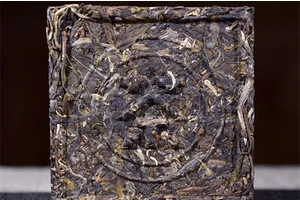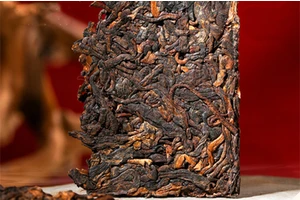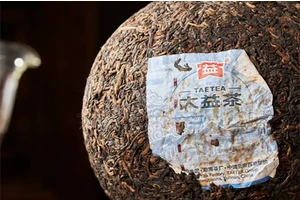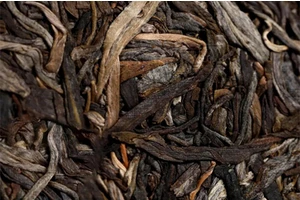China Yunnan Pu 'er: Building an "Experience Platform" to Unlock New Ways of Non-genetic Inheritance
An ancient road connecting ancient and modern times; A fire pond, connected in series with neighborhood harmony; A cup of green tea contains the context of cultural development. Take the ancient tea-horse road and "find" the footprints of the caravan; Climb a leisurely walk and enjoy a feast of intangible heritage ... Yunnan Pu 'er, the "city of tea sources", has too many stories about tea and intangible heritage.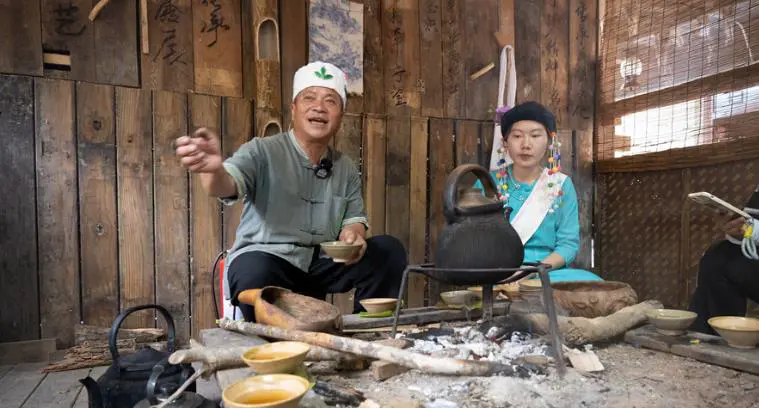
Cultural stories are handed down from generation to generation.
When I heard that there was a visitor from afar, Nankang, the inheritor of the traditional handmade tea-making skill in Jingmai Mountain, picked a stack of fig leaves early and spread them out along the edge of the fireplace to provide an "ecological coaster" for the visiting guests. Make a fire, boil water, and bake tea ... The "baked tea" brewed by Nankang's unique technique is fragrant and long-lasting.
The long practice of production and life has enabled people of all ethnic groups in Jingmai Mountain to create a series of tea custom cultures, including planting tea, eating tea, tasting tea and singing tea. From neighborhood disputes to weddings, funerals and important discussions, many things are solved over tea in Jingmai Mountain.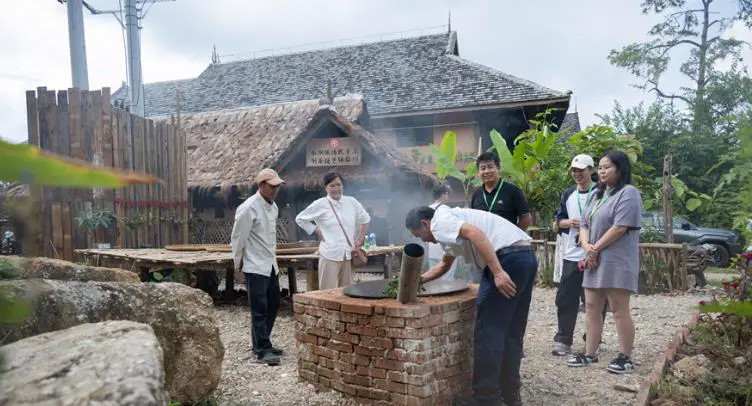
In order to inherit the tea culture and tea-making skills, Nankang led his children and local tea farmers to build organic tea gardens, standardized the production and processing of tea, and taught Bulang clay pot frying, Bulang gourd baking and sour tea making to farmers who joined the cooperative, which effectively promoted the development of local tea industry. In his view, this is the need of cultural inheritance and the sacred mission of being a Jingmaishan person.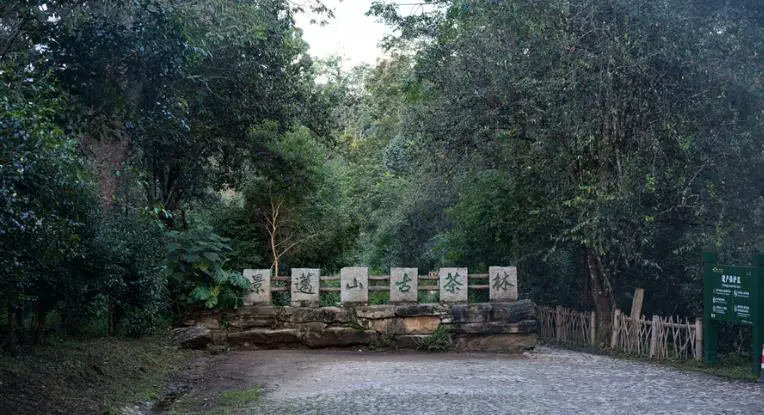
"Where is your tea forest?" Visitors from other places often ask such a question when they come here.
"Where there are flowers, there are bees, where there are insects, there are birds, and where there is tea, there are people. The industrious and simple folk customs of Jingmai Mountain people and the wisdom of protection passed down from generation to generation have jointly built the ancient tea forest cultural landscape and intelligent mountain living environment of' tea in the forest, village in tea, people and tea symbiosis'. We have lived with tea forests for generations, and there are tea forests everywhere on Jingmai Mountain. " Nankang often answers this way.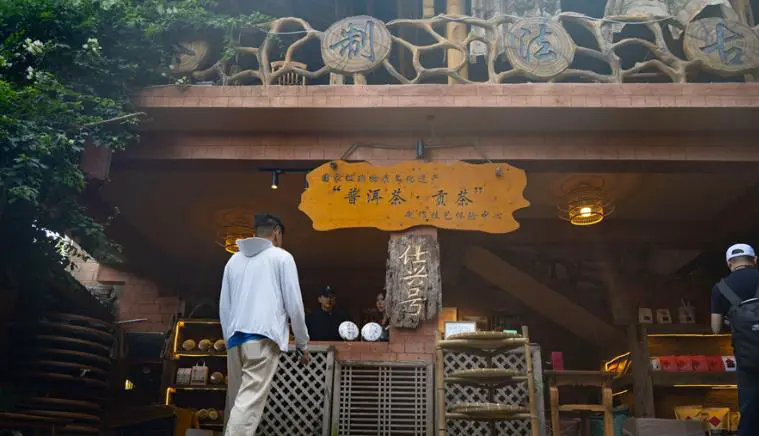
In Jingmai Mountain, every generation of parents will tell their children the story of the legacy left by Paailan, the ancestor of Bulang nationality, and teach them to cherish this natural gift with awe of nature and tea trees.
Today, Jingmai Mountain's story is constantly being told to the world.
On September 17th, 2023, China's "Pu 'er Jingmai Mountain Ancient Tea Forest Cultural Landscape" project passed the deliberation at the 45th World Heritage Conference and was listed in the World Heritage List, becoming the 57th World Heritage in China. The successful application for World Heritage has attracted more foreign tourists, and also made local tea farmers "open their hearts" to the outside world.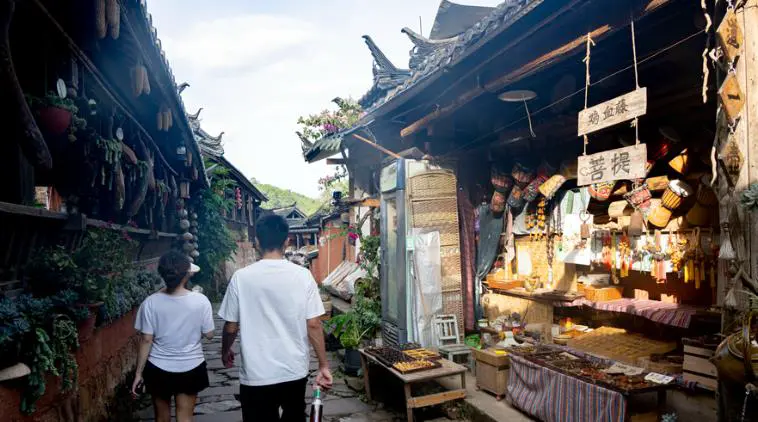
In Jingmai Mountain, you can often see local people dressed in ethnic costumes such as Bulang and Dai warmly inviting foreign tourists to have a chat over tea, telling them the legend of Jingmai Mountain and the story of tea culture and national unity.
Non-genetic inheritance and innovative development
The successful application for World Heritage has also brought new development opportunities for people of all ethnic groups in Jingmai Mountain.
At the end of 2023, Nankang's granddaughter came back to Jingmai Mountain from Beijing, opened a teahouse and coffee shop in her hometown, and innovatively used Yunnan's special fruits as a special tune, adding a different flavor to Jingmai Mountain's tea fragrance.
"Culture must be passed down and innovated." Nankang said.
The national intangible cultural heritage "Pu 'er Tea Gongcha" production skill experience center in Nakori (photo taken on September 25th). Xinhuanet Liu Qishe
Coincidentally, a story about tea and cultural inheritance and innovation is being staged in the scenic spot of Nakeli Tea Horse Station in Tongxin Town, Hani and Yi Autonomous County, Ninger.
With the opportunity of developing rural tourism in Nakori, Gao Shixing, as the inheritor of Pu 'er tea and tribute tea, founded the national intangible cultural heritage "Pu 'er tea and tribute tea" production skill experience center in Nakori's home. Visitors from all over the world can experience the whole process of tea from production to brewing and deeply feel the unique charm of Pu 'er tea culture when they come here.
Yao Keke, a tourist from Shaanxi, experienced the production skills of "Pu 'er Tea Gongcha" with his friends. "Novel, interesting and fun." Yao Keke said that the experience center can make more people feel the strong Pu 'er tea culture besides tasting tea, and also make people from all over the world think more about the inheritance and innovation of intangible cultural heritage. (End)

